| Are you an atheist? Do you believe that ghosts really exist? As a city with a rich past, Beijing has quite a few spooky places that are thought to be haunted by the deceased. While some of the stories are groundless and have no actual proof, the sheer bone-chilling factor attached is enough to make the place attractive in a mysterious sense. One thing that can be said for sure is that next time you walk past Prince Gong’s Mansion and get shivers down your spine, you are not alone.
1 Imperial Palace
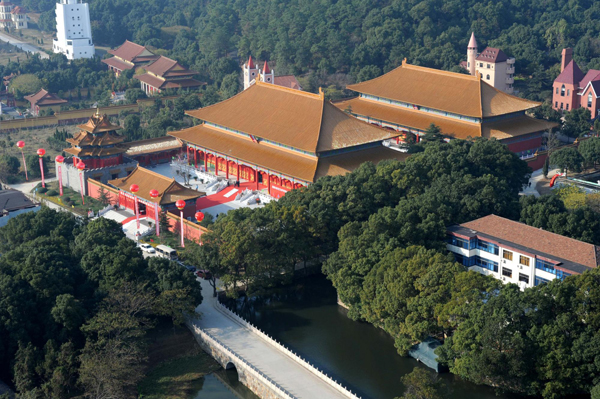
[Photo/Xinhua]
With a history spanning over 600 years, these walls served as the Imperial Palace in the Ming and Qing dynasties, when execution for betrayal or disobedience was common and anyone who was against imperial rule was subject to death. Murder was often committed by a jealous concubine or envious guard. Too many died unnecessarily, creating these bloody red walls. The palace was transformed into a tourist site, with guards put in place in the late 1940s, when the protectors witnessed strange occurrences, including odd animals scurrying about the grounds late at night and a crying woman in white walking the grounds but not responding to people.
Address: Forbidden City
2 Gongwangfu (Prince Gong’s Mansion)
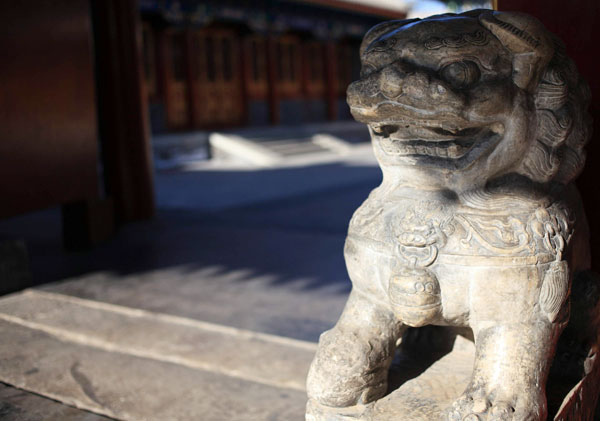
A stone lion at the gate of Prince Gong's Mansion. [Photo/China Photo Press]
The mansion on Liuyin Street of Xicheng district was owned by a notoriously corrupt official of the Qing Dynasty, He Shen and his harem of 80 concubines. His only grace lay in his devotion to his wife, Feng Shi, who fell ill after their youngest son died in a battle against rebels. Then her devoted husband hired monks to pray for her health to return, only to find Feng dying of a broken heart. Rumor has it that the house was haunted by the ghosts of the lady as well as many former escorts of He Shen. Late at night, cries of the mother can be heard echoing through the mansion. Even security guards at the tourist spot say female ghosts in white can be seen wandering around the garden.
Address: Liuyin Street, Xicheng district
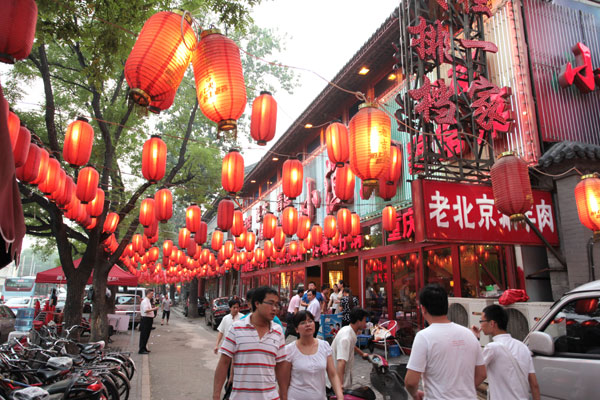
Ghost Street's red lanterns seem to bring good luck to both the restaurants and the diners. Provided to China Daily
Located in Dongzhimen, Guijie is an essential part of life for Beijing citizens. Despite that fact that life here is colorful and peaceful in daytime and at night, far from being gloomy and scary, many ghost stories can be heard from the old timers. According to them, the name Guijie originated from Gui(鬼)jie(街), meaning a street haunted by ghosts; there were many shops selling coffins here with few shoppers several decades ago; business prospects seemed to be dimming since 1997, when the real street of catering came into being, thus spreading its name as a street haunted by ghosts.
Address: Dongzhimen, Dongcheng district
4 Songpo Library
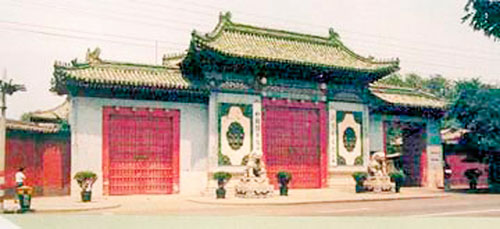
An old photo of Songpo Library.[Photo/Cri.cn]
Seated in Shihu Hutong No.7, Xicheng district, Songpo Library is special in Chinese history since it was the home of Wu Sangui, the general who abandoned Ming Emperor Chongzhen and defected due to his love for his charming courtesan Chen Yuanyuan, a truth proving the saying, ”a beauty can ruin the country.” However, the girl soon felt heartbroken and ended her life by hanging herself when Wu Sangui got tired of her after he took up a cushy post in the Qing court. And for the past 100 years, the girl has been haunting the hutong.
Address: Songpo Library 7 Shihu Hutong, Xicheng district.
5 Chaonei Church
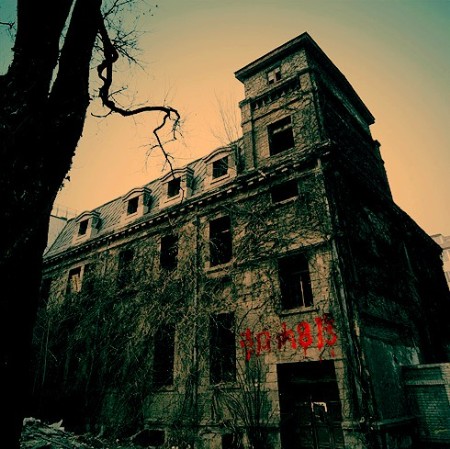
Chaonei Church [Photo/Xinhua]
Located in Chaoyang district in Beijing, Chaonei Church is believed to be connected with a ghost story. Legend has it that a British priest who originally constructed Chaonei disappeared without a trace before the church was completed. A team was then sent to investigate by the Church of England, only to find a strange tunnel from under the crypt to Jiuxianqiao Lu in Dashanzi. Later, before the fall of the Qing Dynasty, the church became the residence of a National Party officer, who was never home. And as a result, his wife was so distraught that she committed suicide in the church. Some nights you can hear her screams in the corridors of the church. Today, although it is abandoned, some who pass by experience a feeling of unease.
Address: Chaonei Church 81 Chaoyangmennei (On the north side of the road, opposite Simin Primary School), Chaoyang district.
6 Huguang Huiguan
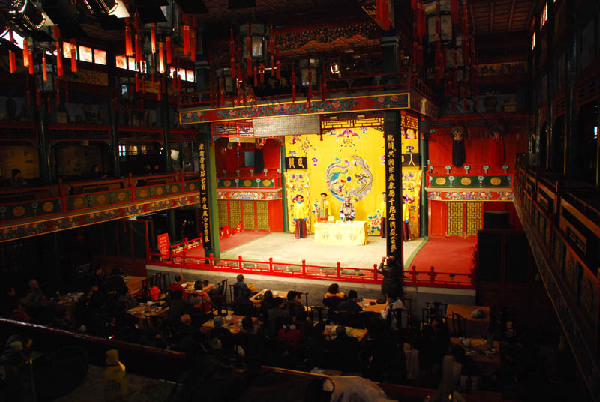 Huguang Huiguan [Photo/CFP]
Huguang Huiguan [Photo/CFP]
Huguang Huiguan was haunted since it was built on an ancient graveyard. During the Republic of China period, a rich philanthropist decided to build a home for the poor on the site but employed a janitor who was so disfigured by leprosy that even the dead couldn’t bear to see him. But now it is an opera museum holding regular performances. Rumor has it that if you throw a stone into the courtyard, loud scolding will be heard, yet there is no one there.
Address: Huguang Huiguan Hufang Bridge, Xuanwu district. Beijing.
7 Tomb of General Yuan
Situated in Chongwen district, Beijing, the tomb of General Yuan is believed to be haunted by his spirit at night. As a loyal supporter of the Ming Dynasty, the general tried everything in his power to protect the land of the imperial family. However, malicious lies were spread in the emperor’s ear, which cast doubt on his good intentions and finally led to his painful death from 1,000 cuts. Rumor has it that he vowed that his soul would always guard Liaodong Peninsula, before his execution. The people of Beijing were so angry about his supposed disloyalty that they ate his remains, leaving only his head, which was saved by one of his faithful soldiers and buried at Guanchu Men, where his family has held guard ever since. Some claim that his ghost wanders around this area at night to seek revenge or guard the land.
Address: General Yuan's tomb, Zhongsitiao, Huashi Dajie, Chongwenmen, Chongwen district.
8 Former Residence of Cao Xueqin
Former Residence of Cao Xueqin.[Photo/CFP]
Rumor has it that the house where Cao Xueqin wrote A Dream of Red Mansions, one of the four great classic Chinese novels, is now owned by a small orchestra in a Xicheng district hutong. Much like the family in this novel, his family was once prominent but later torn apart. He responded by moving into this home, where he created the novel. Despite the house being transformed into a wedding photography studio, local residents said the sound of music playing on traditional stringed and woodwind instruments could be heard late at night, accompanied by a woman reciting poetry.
Address: Cao Xueqin former residence, 33 Xiaoshihu Hutong, Xidan Xicheng district.
|
